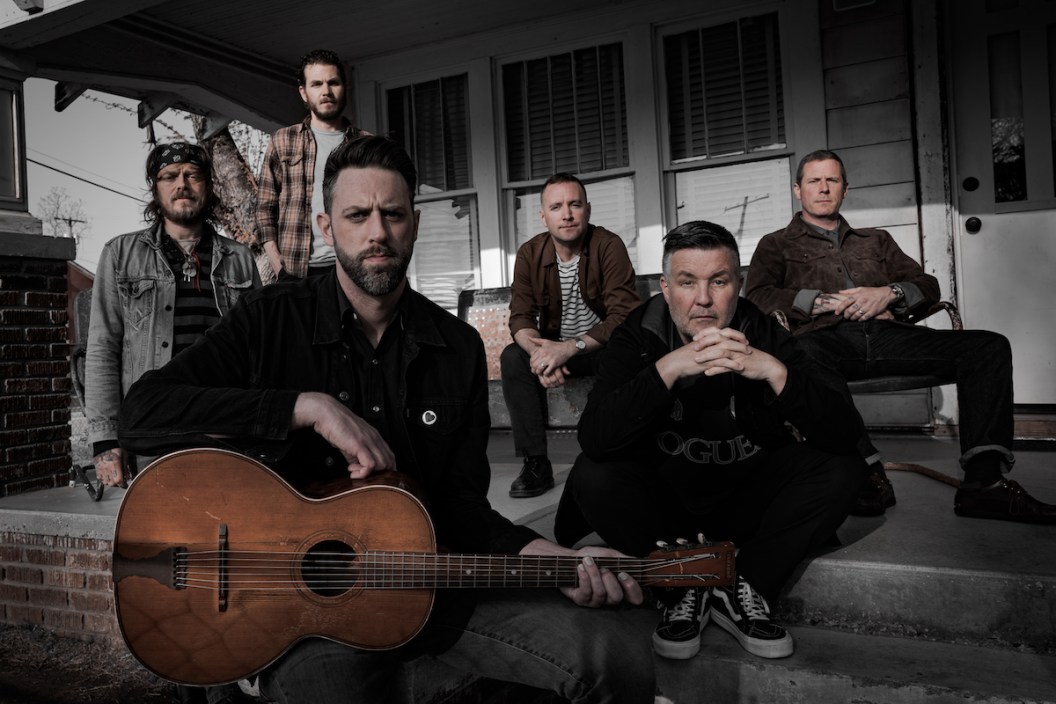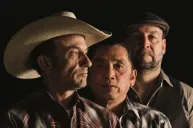Though it arrived almost 55 years to the day of Woody Guthrie's Oct. 3, 1967 death, Dropkick Murphy's new album This Machine Still Kills Fascists (out Sept. 30 on the band's own Dummy Luck Music) qualifies as a multi-genre and multi-generational collaboration.
That's because the streetwise, Boston-based Celtic punks gained access to unpublished lyrics through its 20-plus year friendship with Guthrie's daughter, Nora. Unearthed words by a political and poetic force were set to music for the first time by the band and recorded at the Woody Guthrie Center in Tulsa, Okla.
"The family gave us the opportunity to go through the archives of his songs and the hundreds and hundreds of pages of lyrics he'd never set to music," Dropkicks singer and co-founder Ken Casey told Wide Open Country. "I looked for topics that were similar to my beliefs or that I felt like were important to what's going on in the world today. Then some of the songs, the minute I looked at the song, a cool melody just jumped off the page. Maybe it wasn't necessarily something I was looking for from a point of view of something that needed to be said. It was something where the melody to a song popped into my head."
Casey thought now was the best time to utilize the Guthrie files, based partly on the Dropkick's current musical proficiency.
"You really have to be a really good player to play stripped-down, acoustic Americana music," he said. "I think at this point in our career, we're at that point where we have the confidence to do that. Ten years ago, we probably would've been like 'Just turn that electric guitar up.'"
More notably, these lyrics saw the light of day while the protest songs of acts ranging from Guthrie to influential '80s hardcore band MDC serve as rallying cries on one side of the broadening political spectrum.
"The working class is very divided, especially in America right now, because the working class always stood for a set of values that were the opposite of authoritarianism and fascism and corporate greed," Casey explained. "Now a huge portion of the working class is signing on to support a billionaire — or an alleged billionaire — who doesn't really care about their needs or values and is using fear-mongering to divide the working class. While we bicker among each other, they're passing their tax breaks and making themselves richer and laughing at us in the meantime."
Related Content
Joe Strummer of The Clash deserves partial credit for making this project — or any Dropkicks album — happen. During his pre-Clash days, Strummer billed himself as Woody Mellor, making the U.K. punk godparent a gateway to not just reggae but also folk music.
"I always say that through even school and family, I remember being taught that 'This Land is Your Land' was like the peoples' national anthem, so I already had this sense that Woody was a man of the people," Casey said. "But then when I became a teenager and realized that my musical influences like Strummer and Springsteen and all of those people revered him so much, that's when I started to dig deeper. Thank God for people like Strummer who led me to a deeper understanding of Woody."
Explorations of Guthrie's music and motives reveal a fearless and rebellious spirit who's arguably no less of a proto-punk than Iggy Pop.
"I think of Woody Guthrie as an original punk," Casey shared. "It's so much easier to do it with a wall of sound. Oftentimes when you see the photos of Woody playing to the people, there was no amplifier. He had to be up close and personal, oftentimes singing songs that an element of the world didn't want to hear. He wasn't scared. He went and did it anyway."
Stylistically and ideologically, unplugging its electric guitars and promoting itself at events like Nashville's AmericanaFest aren't drastic departures for the Dropkick Murphys. Even on the debut album Do or Die (1998), there are two acoustic numbers: "Faraway Coast" and "Boys on the Docks." And of course, the Celtic half of the Celtic punk equation digs into the deepest roots (along with African traditions) of American music.
"I look at Celtic music and Americana as true first cousins," Casey said. "Then as far as our punk background goes, we've always written on acoustic guitars and we've always had an acoustic element in our music. We've always had this stripped-down side to us. Maybe we were afraid to show it more. But as we've been around for 26 years and in the spirit of tribute to Guthrie, we figured that this was a good way to do it."
The band's upcoming acoustic tour will further magnify the folk influence that's always been there through slight tweaks to familiar tunes.
"When I think about some of our songs that would be considered Celtic, a turn of one note could change the feel of this song," Casey explained. "The instrumentation is all the same. As we prepare to tour on this Guthrie record, we're taking a lot of our old songs and kind of giving them an Americana twist to fit with the rest of the tour. It's a lot more subtle than you think to make it work that way."
Per the song selection on This Machine Still Kills Fascists, Guthrie was so far ahead of his time that he coincidentally predicted Conway Twitty and Loretta Lynn-style snark (Casey's Nikki Lane duet "Never Git Drunk No More") and chant-along punk stompers ("All You Fonies" and "Where the Trouble Is At").
Two additional standouts —"Ten Times More" and Evan Felker (Turnpike Troubadours) collaboration "The Last One" — address blue-collar Americans: a recurring topic in the Dropkicks discography.
This Machine Still Kills Fascists isn't the first time the Dropkicks have crossed creative paths with Guthrie. Nor is it the last. Two fan favorites, 2003's "Gonna Be a Blackout Tonight" and the ubiquitous 2005 anthem "I'm Shipping Up to Boston," incorporate the folk legend's immortal words. The band recorded enough material in Oklahoma for a second 10-song album, which should arrive in 2023.
"Topically, it was all kind of the same throughout the 20 songs, but we felt like the grouping of the first album had a little bit more of a darker, minor-y, creepy sound to them in some ways," Casey said. "The second 10, even though there's some heavy themes on them, was more like foot-stomping, brighter, singalong, maybe more Dropkick Murphys-esque. So we felt like the grouping had a purpose. It wasn't like these are the 10 best and these are the leftovers."
The album closes with "Dig a Hole," a song that samples Guthrie in its intro and unapologetically rails against fascism.
"Any artist would be thrilled to hear that their music and their lyrics are relevant 80, 90 years later, but something tells me that if Woody knew that his songs would be really important in the fight against what's happening in the world right now, he probably would be bummed that that's still going on and, if anything, gaining some traction," Casey added. "But thank God his voice can be heard via people like us."




